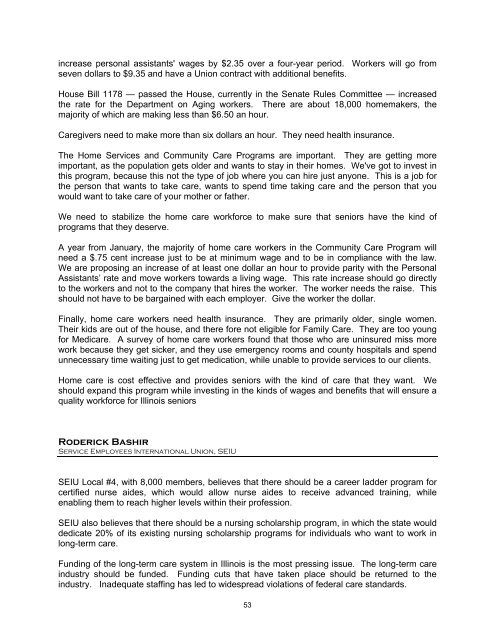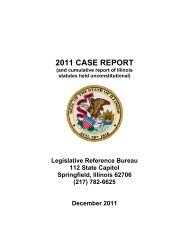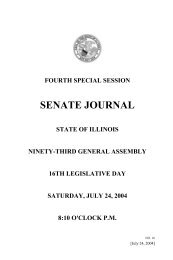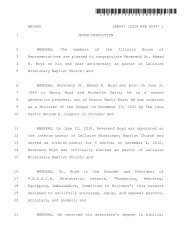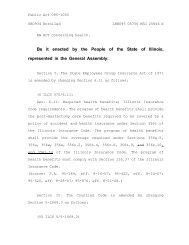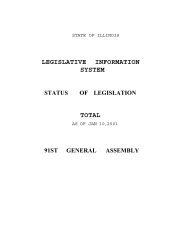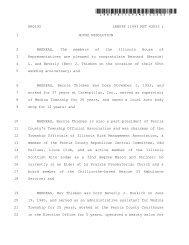Long-Term Care - Illinois General Assembly
Long-Term Care - Illinois General Assembly
Long-Term Care - Illinois General Assembly
You also want an ePaper? Increase the reach of your titles
YUMPU automatically turns print PDFs into web optimized ePapers that Google loves.
increase personal assistants' wages by $2.35 over a four-year period. Workers will go from<br />
seven dollars to $9.35 and have a Union contract with additional benefits.<br />
House Bill 1178 — passed the House, currently in the Senate Rules Committee — increased<br />
the rate for the Department on Aging workers. There are about 18,000 homemakers, the<br />
majority of which are making less than $6.50 an hour.<br />
<strong>Care</strong>givers need to make more than six dollars an hour. They need health insurance.<br />
The Home Services and Community <strong>Care</strong> Programs are important. They are getting more<br />
important, as the population gets older and wants to stay in their homes. We've got to invest in<br />
this program, because this not the type of job where you can hire just anyone. This is a job for<br />
the person that wants to take care, wants to spend time taking care and the person that you<br />
would want to take care of your mother or father.<br />
We need to stabilize the home care workforce to make sure that seniors have the kind of<br />
programs that they deserve.<br />
A year from January, the majority of home care workers in the Community <strong>Care</strong> Program will<br />
need a $.75 cent increase just to be at minimum wage and to be in compliance with the law.<br />
We are proposing an increase of at least one dollar an hour to provide parity with the Personal<br />
Assistants’ rate and move workers towards a living wage. This rate increase should go directly<br />
to the workers and not to the company that hires the worker. The worker needs the raise. This<br />
should not have to be bargained with each employer. Give the worker the dollar.<br />
Finally, home care workers need health insurance. They are primarily older, single women.<br />
Their kids are out of the house, and there fore not eligible for Family <strong>Care</strong>. They are too young<br />
for Medicare. A survey of home care workers found that those who are uninsured miss more<br />
work because they get sicker, and they use emergency rooms and county hospitals and spend<br />
unnecessary time waiting just to get medication, while unable to provide services to our clients.<br />
Home care is cost effective and provides seniors with the kind of care that they want. We<br />
should expand this program while investing in the kinds of wages and benefits that will ensure a<br />
quality workforce for <strong>Illinois</strong> seniors<br />
Roderick Bashir<br />
Service Employees International Union, SEIU<br />
SEIU Local #4, with 8,000 members, believes that there should be a career ladder program for<br />
certified nurse aides, which would allow nurse aides to receive advanced training, while<br />
enabling them to reach higher levels within their profession.<br />
SEIU also believes that there should be a nursing scholarship program, in which the state would<br />
dedicate 20% of its existing nursing scholarship programs for individuals who want to work in<br />
long-term care.<br />
Funding of the long-term care system in <strong>Illinois</strong> is the most pressing issue. The long-term care<br />
industry should be funded. Funding cuts that have taken place should be returned to the<br />
industry. Inadequate staffing has led to widespread violations of federal care standards.<br />
53


